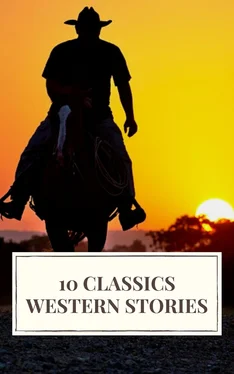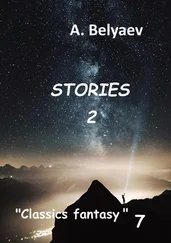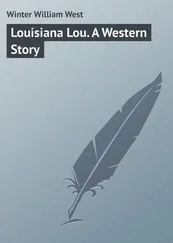Below the falls, strong swimmers, leaping into the water, brought the dead to land. Beneath a pine-tree that grew close by the great Columbia trail and not far from the falls, the bodies were laid. The daughter of Multnomah lay in rude state upon a fawn-skin; while at her feet were extended the brawny forms of the two canoe-men who had died with her, and who, according to Indian mythology, were to be her slaves in the Land of the Hereafter. Her face was very lovely, but its mournfulness remained. Her flute, broken in the shock that had killed her, was still attached to her belt. The Indians had placed her hand at her side, resting upon the flute; and they noticed in superstitious wonder that the cold fingers seemed to half close around it, as if they would clasp it lovingly, even in death. Indian women knelt beside her, fanning her face with fragrant boughs of pine. Troop after troop, returning over the trail to their homes, stopped to hear the tale, and to gaze at the dead face that was so wonderfully beautiful yet so sad.
All day long the bands gathered; each stopping, none passing indifferently by. At length, when evening came and the shadow of the wood fell long and cool, the burials began. A shallow grave was scooped at Wallulah’s feet for the bodies of the two canoe-men. Then chiefs—for they only might bury Multnomah’s daughter—entombed her in a cairn; being Upper Columbia Indians, they buried her, after the manner of their people, under a heap of stone. Rocks and bowlders were built around and over her body, yet without touching it, until the sad dead face was shut out from view. And still the stones were piled above her; higher and higher rose the great rock-heap, till a mighty cairn marked the last resting-place of Wallulah. And all the time the women lifted the death-wail, and Snoqualmie stood looking on with folded arms and sullen baffled brow. At length the work was done. The wail ceased; the gathering broke up, and the sachems and their bands rode away, Snoqualmie and his troop departing with them.
Only the roar of the cascades broke the silence, as night fell on the wild forest and the lonely river. The pine-tree beside the trail swayed its branches in the wind with a low soft murmur, as if lulling the sorrow-worn sleeper beneath it into still deeper repose. And she lay very still in the great cairn,—the sweet and beautiful dead,—with the grim warriors stretched at her feet, stern guardians of a slumber never to be broken.
Chapter 4 MULTNOMAH’S DEATH-CANOE.
Gazing alone
To him are wild shadows shown.
Deep under deep unknown.
Dante Rossetti.
If Multnomah was grieved at his daughter’s death, if his heart sunk at the unforeseen and terrible blow that left his empire without an heir and withered all his hopes, no one knew it; no eye beheld his woe. Silent he had ever been, and he was silent to the last. The grand, strong face only grew grander, stronger, as the shadows darkened around him; the unconquerable will only grew the fiercer and the more unflinching. But ere the moon that shone first on Wallulah’s new-made cairn had rounded to the full, there was that upon him before which even his will bowed and gave way,—death, swift and mysterious. And it came in this wise.
We have told how at the great potlatch he gave away his all, even to the bear-skins from his couch, reserving only those cases of Asiatic textures never yet opened,—all that now remained of the richly laden ship of the Orient wrecked long ago upon his coast. They were opened now. His bed was covered with the magnificent fabrics; they were thrown carelessly over the rude walls and seats, half-trailing on the floor; exquisite folds of velvet and damask swept the leaves and dust,—so that all men might see how rich the chief still was, though he had given away so much. And with his ostentation was mixed a secret pride and tenderness that his dead wife had indirectly given him this wealth. The war-chief’s woman had brought him these treasures out of the sea; and now that he had given away his all, even to the bare poles of his lodge, she filled it with fine things and made him rich again,—she who had been sleeping for years in the death-hut on mimaluse island. Those treasures, ere the vessel that carried them was wrecked, had been sent as a present from one oriental prince to another. Could it be that they had been purposely impregnated with disease, so that while the prince that sent them seemed to bestow a graceful gift, he was in reality taking a treacherous and terrible revenge? Such things were not infrequent in Asiatic history; and even the history of Europe, in the middle ages, tells us of poisoned masks, of gloves and scarfs charged with disease.
Certain it is that shortly after the cases were opened, a strange and fatal disease broke out among Multnomah’s attendants. The howling of medicine-men rang all day long in the royal lodge; each day saw swathed corpses borne out to the funeral pyre or mimaluse island. And no concoction of herbs,—however skilfully compounded with stone mortar and pestle,—no incantation of medicine-men or steaming atmosphere of sweat-house, could stay the mortality.
At length Multnomah caught the disease. It seemed strange to the Indians that the war-chief should sicken, that Multnomah should show any of the weaknesses of common flesh and blood; yet so it was. But while the body yielded to the inroad of disease, the spirit that for almost half a century had bent beneath it the tribes of the Wauna never faltered. He lay for days upon his couch, his system wasting with the plague, his veins burning with fever, holding death off only by might of will. He touched no remedies, for he felt them to be useless; he refused the incantations of the medicine-men; alone and in his own strength the war-chief contended with his last enemy.
All over the Willamette Valley, through camp and fishery, ran the whisper that Multnomah was dying; and the hearts of the Indians sunk within them. Beyond the mountains the whisper passed to the allied tribes, once more ripe for revolt, and the news rang among them like a trumpet call; it was of itself a signal for rebellion. The fall of the magic Bridge, the death of Wallulah, and the fatal illness of Multnomah had sealed the doom of the Willamettes. The chiefs stayed their followers only till they knew that he was dead. But the grand old war-chief seemed determined that he would not die. He struggled with disease; he crushed down his sufferings; he fought death with the same silent, indomitable tenacity with which he had overthrown the obstacles of life.
In all his wasting agony he was the war-chief still, and held his subjects in his grip. To the tribes that were about to rebel he sent messages, short, abrupt, but terrible in their threat of vengeance,—messages that shook and awed the chiefs and pushed back invasion. To the last, the great chief overawed the tribes; the generation that had grown up under the shadow of his tyranny, even when they knew he was dying, still obeyed him.
At length, one summer evening a few weeks after the burial of Wallulah, there burst forth from the war-chief’s lodge that peculiar wail which was lifted only for the death of one of the royal blood. No need to ask who it was, for only one remained of the ancient line that had so long ruled the Willamettes; and for him, the last of his race, was the wail lifted. It was re-echoed by the inmates of the surrounding lodges; it rang, foreboding, mournful, through the encampment on Wappatto Island.
Soon, runners were seen departing in every direction to bear the fatal news throughout the valley. Twilight fell on them; the stars came out; the moon rose and sunk; but the runners sped on, from camp to camp, from village to village. Wherever there was a cluster of Willamette lodges, by forest, river, or sea, the tale was told, the wail was lifted. So all that night the death-wail passed through the valley of the Willamette; and in the morning the trails were thronged with bands of Indians journeying for the last time to the isle of council, to attend the obsequies of their chief, and consult as to the choice of one to take his place.
Читать дальше












